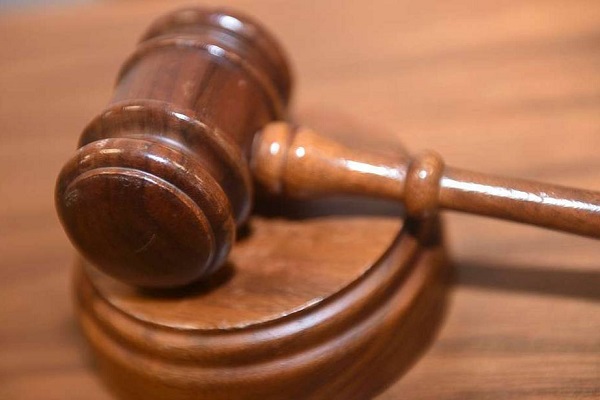
(function(d, s, id) { var js, fjs = d.getElementsByTagName(s)[0]; if (d.getElementById(id)) return; js = d.createElement(s); js.id = id; js.src = “https://connect.facebook.net/en_US/sdk.js#xfbml=1&version=v3.0”; fjs.parentNode.insertBefore(js, fjs); }(document, ‘script’, ‘facebook-jssdk’)); –>
–>
September 17, 2023
John Eastman is a distinguished constitutional expert who had the temerity to advise Donald Trump on legal theories by which suspect electoral results in the 2020 election could be challenged. These are perfectly valid theories, one should note, and, in a better world, they would have been addressed by the Supreme Court.
‘); googletag.cmd.push(function () { googletag.display(‘div-gpt-ad-1609268089992-0’); }); document.write(”); googletag.cmd.push(function() { googletag.pubads().addEventListener(‘slotRenderEnded’, function(event) { if (event.slot.getSlotElementId() == “div-hre-Americanthinker—New-3028”) { googletag.display(“div-hre-Americanthinker—New-3028”); } }); }); }
For this, he has been viciously attacked by the legal academy, indicted by a rabid Georgia grand jury, and subjected to disbarment proceedings by the California Bar Association. In a recent American Thinker post, Monica Showalter describes the lynch-law nature of the California proceeding, linking to excellent reporting by Rachel Alexander in the Arizona Sun Times.
If the U.S. courts of appeal and the Supreme Court have any sense of obligation to the law (a debatable assumption, to be sure), Eastman will ultimately be vindicated.
But that is of little moment to his persecutors. Any vindication will be years in the future, while in the present, Eastman must find lawyers willing to represent him and thus risk the ire of the organized bar. When he does, he will be crushed by legal fees and deprived of opportunities to make a living. He is also distracted from using his great talents to contribute to the national debate over past and future election fraud and other important legal topics, which is a serious harm to the nation and the profession. California is treading upon my First Amendment rights, and those of the public, to obtain information.
‘); googletag.cmd.push(function () { googletag.display(‘div-gpt-ad-1609270365559-0’); }); document.write(”); googletag.cmd.push(function() { googletag.pubads().addEventListener(‘slotRenderEnded’, function(event) { if (event.slot.getSlotElementId() == “div-hre-Americanthinker—New-3035”) { googletag.display(“div-hre-Americanthinker—New-3035”); } }); }); }
The objective of the persecutors is not just to get Eastman, but to send a message to everyone in the legal world that if people publicly challenge the dominant narrative, they too will be broken on the wheel of financial ruin. Judging by the tone of the mainstream media, the tactic is working fine. The only people who know the truth are those attuned to such sites as American Thinker. Readers of the NYT or WSJ assume that the inquisitors are righteous.
The action against Eastman is part of a comprehensive program of filing ethics complaints against attorneys who question the 2020 election results. The leader of this enterprise is Project 65, which says it has filed 77 of them. It portrays itself as a defender of legal ethics:
[A] bipartisan effort to protect democracy from these once-and-future abuses by holding accountable Big Lie Lawyers who bring fraudulent and malicious lawsuits to overturn legitimate election results, and by working with bar associations to deter future abuses by establishing clear standards for conduct that punish lies about the conduct or results of elections.
The Project 65 website gives no clue about its funding sources. As a 501(c)(3) organization, it holds itself out to the public and the government as a non-political charity and solicits donations. But of the three staff members it lists, the managing director “was General Counsel of a national advocacy organization [unnamed] dedicated to expanding ballot access”; the communications strategist is “a veteran of Democratic and progressive political and legislative campaigns”; and the senior adviser “served as a political appointee in the Clinton Administration,” was a founder of “a non-profit dedicated to supporting and protecting the Mueller Investigation,” and was the “Finance Director of the Democratic National Committee.”
The managing director, Michael Teter, bears the same name as the lawyer for Ray Epps, of Jan 6 fame.
Several of the Project 65 complaints are against state attorneys general who filed amicus briefs in Texas v. Pennsylvania, which challenged the 2020 results on the basis of a number of irregularities in key states. The Supreme Court refused to hear the case on procedural grounds, but Texas certainly documented many serious deficiencies that were never tested in court. To complain that support for the case was unethical brands the complainer as either legally inept or, himself, unethical.
‘); googletag.cmd.push(function () { googletag.display(‘div-gpt-ad-1609268078422-0’); }); document.write(”); googletag.cmd.push(function() { googletag.pubads().addEventListener(‘slotRenderEnded’, function(event) { if (event.slot.getSlotElementId() == “div-hre-Americanthinker—New-3027”) { googletag.display(“div-hre-Americanthinker—New-3027”); } }); }); } if (publir_show_ads) { document.write(“
This latter possibility gets to the nub of the matter. The American Bar Association code of conduct specifies that “a lawyer shall not bring or defend a proceeding, or assert or controvert an issue therein, unless there is a basis in law and fact for doing so that is not frivolous.” In civil litigation, a lawyer signing a document certifies that “it is not being presented for any improper purpose, such as to harass, cause unnecessary delay, or needlessly increase the cost of litigation.”
The post-2020 election period was chaotic. Many lawsuits were filed, some probably frivolous, many quite good. Unfortunately, all were tossed on procedural grounds and none decided on the merits, which has left the nation in its current state of festering rancor. For the legal establishment to assert that anyone who raised questions during this time was acting unethically strikes me as itself unethical, because these complaints seem to be the epitome of actions designed to harass and increase costs.
The final question is, what is the state of mind of these complainants? Are they so wrapped in their own propaganda that they think that they are the good guys? Did they not read between the lines of the Time article on the election? Are they incapable of understanding the testimony of a retired Wisconsin Supreme Court judge in support of Eastman? Do they think the cause of getting Trump is so righteous that it trumps any obligation to the Rule of Law? What does it say about the state of the legal profession that this narrative has become dominant?
My hope is that what we are seeing is a layer of well funded progressive activists determined to stampede the legal profession, in the equivalent of a political coup, and that we will see a reaction and a reassertion of real rather than faux legal ethics.
If not, then it is time to quote the famous words from A Man for All Seasons: “and if you cut [the laws] down … d’you really think you could stand upright in the winds that would blow then?”
James V DeLong is a former book review editor of the Harvard Law Review and a former research director of the Administrative Conference of the United States.

Image via Picryl.
<!–
–>
<!– if(page_width_onload <= 479) { document.write("
“); googletag.cmd.push(function() { googletag.display(‘div-gpt-ad-1345489840937-4’); }); } –> If you experience technical problems, please write to [email protected]
FOLLOW US ON
<!–
–>
<!– _qoptions={ qacct:”p-9bKF-NgTuSFM6″ }; ![]() –> <!—-> <!– var addthis_share = { email_template: “new_template” } –>
–> <!—-> <!– var addthis_share = { email_template: “new_template” } –>





